#oldwritersblog
Explore tagged Tumblr posts
Text
Why Typewriters?
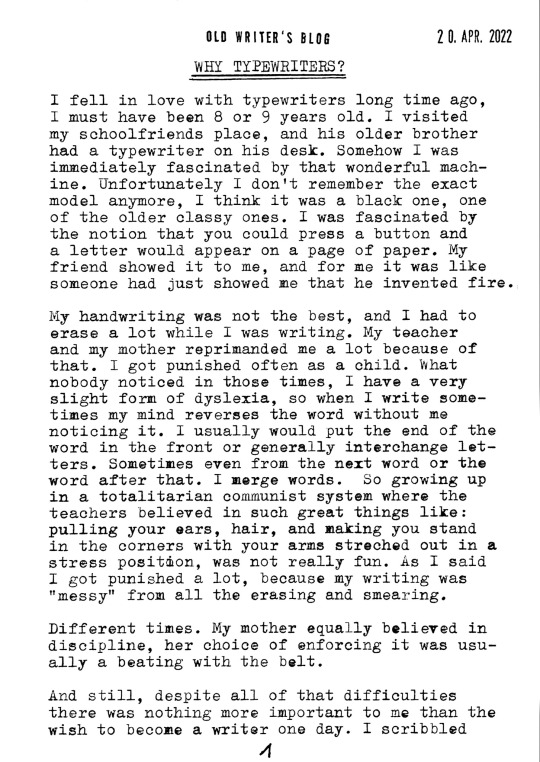

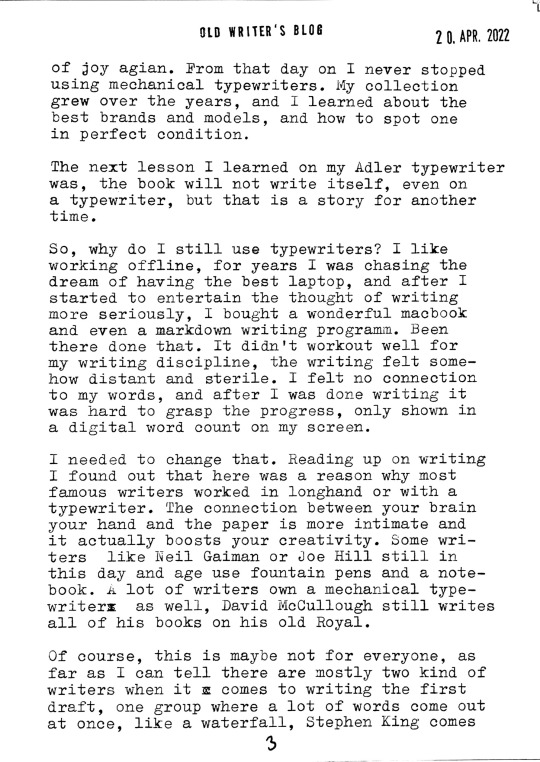
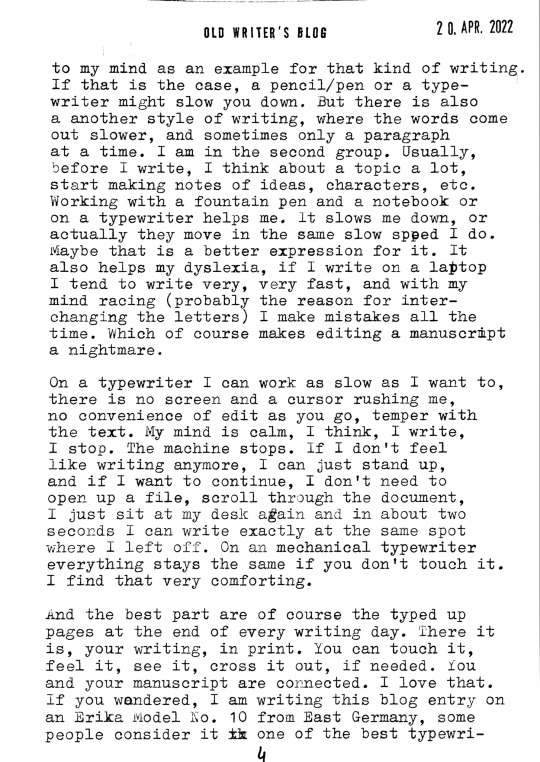
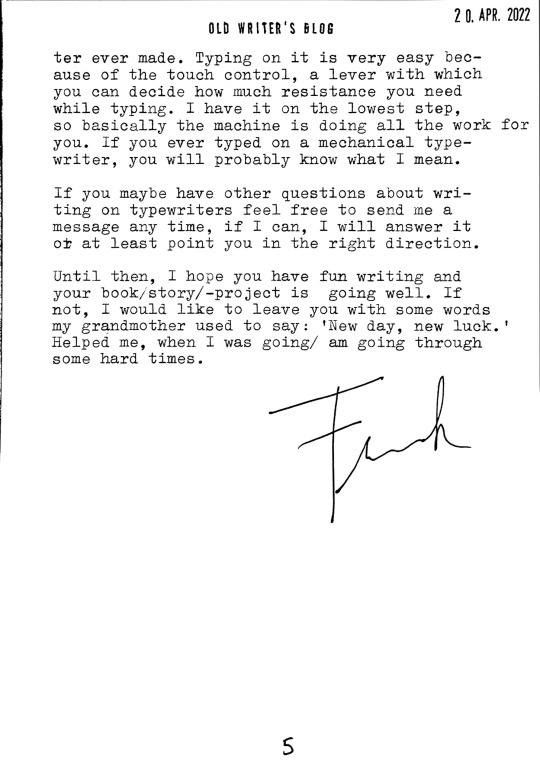
I fell in love with typewriters long time ago, must have been 8 or 9 years old. I visited my schoolfriends place, and his older brother had a typewriter on his desk. Somehow I was immediately fascinated by that wonderful machine. Unfortunately I don’t remember the exact model anymore I think it was a black one, one of the older classy ones. I was fascinated by the notion that you could press a button and a letter would appear on a page of paper. My friend showed it to me, and for me it was like someone had just showed me that he invented fire.
My handwriting was not the best, and I had to erase a lot while I was writing. My teacher and my mother reprimanded me a lot because of that. I got punished often as a child. What nobody noticed in those times, I have a very slight form of dyslexia so when I write sometimes my mind reverses the word without me noticing it. I usually would put the end of the word in the front or generally interchange letters. Sometimes even from the next word or the word after that, I merge words. So growing up in a totalitarian communist system where the teachers believed in such great things like: pulling your ears, hair, and making you stand in the corners with your arms streched out in a stress position, was not really fun. As I said I got punished a lot, because my writing was „messy“, from all the erasing and smearing.
Different times. My mother equally believed in discipline, her choice of enforcing it was usually a beating with the belt.
And still, despite all of that difficulties there was nothing more important to me than the wish to become a writer one day. I scribbled some stories with my pencil on some paper my dad organized for me, and after I saw that magical machine on that one afternoon I had the feeling, one day I could acchieve my dream of becoming a writer. Because the typewriter would fix all my problems. In my childish heart I believed if I only could get my hands on a typewriter the novel/book would practicaly write itself (I didn’t know how hard writing is back then hahaha).
I come from a poor working class family, so buying one was not really a option. But the image of that one afternoon, the typewriter in all its glory, the picture of it in a interplay of light and shadows of the room, the wonderful typing paper with its own watermark, feeling it touching it, was burned into my mind forever.
A couple of years later, we moved to Austria (there was a war in my country and unfortunately my dad died in it, so we had to move to my moms family to Austria) and in those hard times I managed to get my hands on a typewriter. I helped translating for a refugee-helping organisation, when they needed someone. Despite being very young (13-14) they took a liking to me and usually awarded me with some chocolate or some money. One day they asked me if there was something that I would maybe need, and there it was, my big oportunity I told the nice lady that I would wish to have a typewriter. And a couple of days later they came to my home and brought me one. It was a grey Adler typewriter, the ones you would buy for a schoolchild. Not very sophisticated but I was overjoyed. It was a used one, and the ribbon was very light, it typed a bit clunky and hardgoing, but this was the best gift unto today I ever recieved in my life. Sometimes I wish I could feel that kind of joy again. From that day on I never stopped using mechanical typewriters. My collection grew over the years and I learned about the best brands and models, and how to spot one in perfect condition.
The next lesson I learned on my Adler typewriter was, the book will not write itself, even on a typewriter, but that is a story for another time.
So why do I still use typewriters? I like working offline, for years I was chasing the dream of having the best laptop, and after I started to entertain the thought of writing more seriously I bought a wonderful macbook and even a markdown writing programm. Been there done that. It didn’t work out well for my writing discipline, the writing felt somehow distant and sterile. I felt no connection to my words, and after I was writing, it was hard to grasp the progress, only shown in a digital word count on my screen.
I needed to change that. Reading up on writing I found out that there was a reason why most famous writers worked in longhand or with a typewriter. The connection between your brain, your hand, and the paper, is more intimate and it actually boosts your creativity. Some writers like Neil Gaiman, or Joe Hill, still in this day and age use fountain pens and a notebook. A lot of writers own a mechanical typewriter as well, David McCullough still writes all of his books on his old Royal.
Of course this is maybe not for everyone, as far as I can tell there are mostly two kind of writers when it comes to writing the first draft, one group where a lot of words come out at once, like a waterfall, Stephen King comes to my mind as an example for that kind of writing. If that is the case, a pencil/pen or a type writer might slow you down too much and be contraproductive. But there is also a another style of writing, where the words come out slower, and sometimes only a paragraph at a time. I am in the second group. Usually, before I write, I think about a topic a lot, start making notes of ideas, characters, etc. Working with a fountain pen and a notebook or on a typewriter helps me. It slows me down, or actually they move in the same slow speed I do. Maybe that is a better expression for it. It also helps my dyslexia, if I write on a laptop I tend to write very, very fast, and with my mind racing (probably the reason for interchanging the letters) I make mistakes all the time. Which of course makes editing a manuscript a nightmare.
On a typewriter I can work as slow as I want to, there is no screen and a cursor rushing me, no convenience of edit as you go, temper with the text. My mind is calm, I think, I write, I stop. The machine stops. If I don’t feel like writing anymore I can just stand up, and if I want to continue, I don’t need to open up a file, scroll through the document, I just sit at my desk again and in about two seconds I can write exactly at the same spot where I left off. On an mechanical typewriter everything stays the same if you don’t touch it. I find that very comforting.
And the best part are of course the typed up pages at the end of every writing day. There it is, your writing, in print. You can touch it, feel it, see it, cross it out, if needed. You and your manuscript are connected. I love that. If you wondered I am writing this blog entry on an Erika Model No. 10 from East Germany, some people consider it one of the best typewriter ever made. Typing on it is very easy because of the touch control, a lever with which you can decide how much resistance you need while typing. I have it on the lowest step, so basically the machine is doing all the work for you. If you ever typed on a mechanical typewriter, you will probably know what I mean.
If you maybe have other questions about writing on typewriters feel free to send me a message any time, if I can, I will answer it or at least point you in the right direction.
Until then I hope you have fun writing and your book/story -project is going well. If not, I would like to leave you with some words my grandmother used to say: „New day, new luck.“ Helped me when I was going/am going through some hard times.
#writer#writeblr#new blog#new writing blog#new writeblr#writerslife#creative writing#practice your writing#writers on tumblr#writerscommunity#writing#books#your writing#blog#oldwritersblog#typewriter#writer problems#ask me about paper#fountain pens#novel writing#ask me about my typewriter
38 notes
·
View notes
Text
My red-pencil is blue
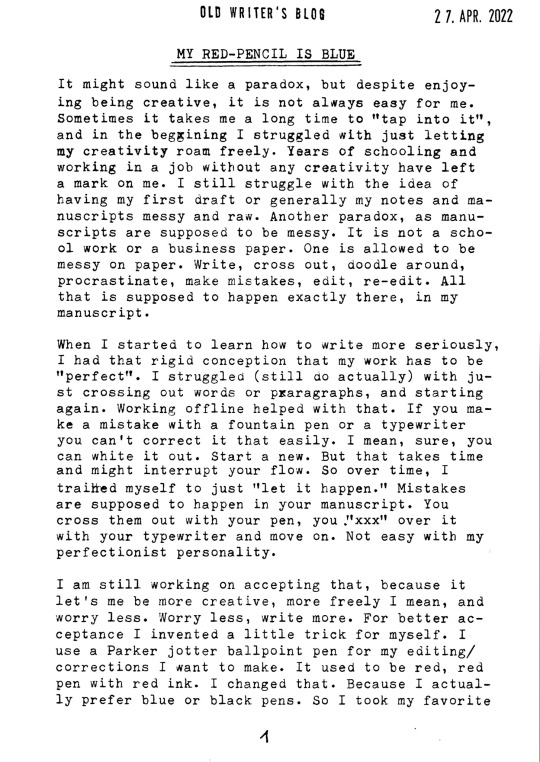
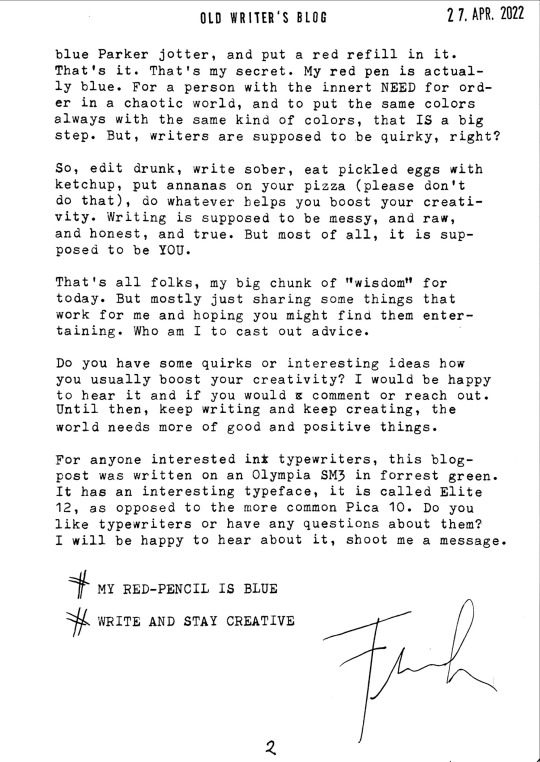
It might sound like a paradox, but despite enjoying being creative, it is not always easy for me. Sometimes it takes me a long time to "tap into it", and in the begining I struggled with just letting my creativity roam freely. Years of schooling and working in a job without any creativity have left a mark on me. I still struggle with the idea of having my first draft or generally my notes, and manuscripts messy and raw. Another paradox, as manuscripts are supposed to be messy. It is not a school work or a business paper. One is allowed to be messy on paper. Write, cross out, doodle around, procrastinate, make mistakes, edit, re-edit. All that is supposed to happen exactly there, in my manuscript.
When I started to learn how to write more seriously, I had that rigid conception that my work has to be "perfect". I struggled (still do actually) with just crossing out words or paragraphs, and starting again. Working offline helped with that. If you make a mistake with a fountain pen or a typewriter you can't correct it that easily. I mean, sure, you can white it out. Start a new. But that takes time and might interrupt your flow. So over tine, I trained myself to just "let it happen." Mistakes are supposed to happen in your manuscript. You cross them out with your pen, you "xxx"" over it with your typewriter and move on. Not easy with my perfectionist personality.
I am still working on accepting that, because it let's me be more creative, more freely I mean, and worry less. Worry less, write more. For better acceptance I invented a little trick for myself. I use a Parker jotter ballpoint pen for my editing/corrections I want to make. It used to be red, red pen with red ink. I changed that. Because I actually prefer blue or black pens. So I took my favorite blue Parker jotter, and put a red refill in it. That's it. That's my secret. My red pen is actually blue. For a person with the innert NEED for order in a chaotic world, and to put the same colors always with the same kind of colors, that IS a big step. But, writers are supposed to be quirky, right?
So, edit drunk, write sober, eat pickled eggs with ketchup, put annanas on your pizza (please don't do that), do whatever helps you boost your creativity. Writing is supposed to be messy, and raw, and honest, and true. But most of all, it is supposed to be YOU.
That's all folks, my big chunk of "wisdom" for today. But mostly just sharing some things that work for me and hoping you might find them entertaining. Who am I to cast out advice.
Do you have some quirks or interesting ideas how you usually boost your creativity? I would be happy to hear it and if you would comment or reach out. Until then, keep writing and keep creating, the world needs more of good and positive things.
For anyone interested in typewriters, this blogpost was written on an Olympia SM3 in forrest green. It has an interesting typeface, it is called Elite 12, as opposed to the more common Pica 10. Do you like typewriters or have any questions about them? I will be happy to hear about it, shoot me a message.
# MY RED-PENCIL IS BLUE
# WRITE AND STAY CREATIVE
#writer#writers on tumblr#writerslife#writing#books#typewriter#writer problems#novel writing#fountain pens#practice your writing#writing blog#new writing blog#creative writing#aspiring writer#writersnetwork#writerscorner#writersociety#writers block#writerscommunity#oldwritersblog#author#books and novels#novels#art#artists on tumblr#my art
25 notes
·
View notes
Text
The Discipline of Writing,
and why I hate it.


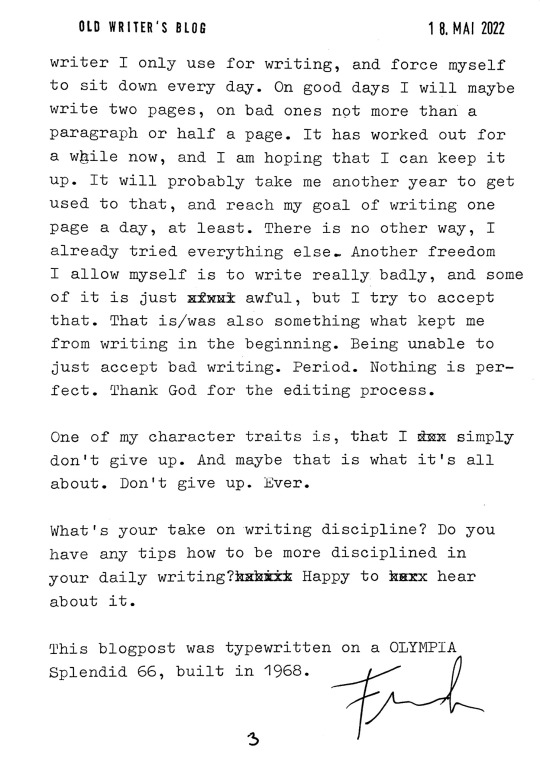
Well maybe hate is a harsh word, let's use strongly dislike. And I don't hate discipline itself, but mostly my lack of it. But we will never know for sure. When I started, there where all of those advices I found online, write every day, even if you don't feel like it, write badly, write anyhow, but mostly like Gertrude Stein said: write, write, write.
And of course that is true, as someone smarter than me once said, you can't edit a blank page. But as a beginner writer, I struggled with that. Well, still am in some way. In the beginning I tried to write every day, that didn't work out at all. My brain just refused. I sat there in panic. Nothing. But the next day, I tried again. Sometimes it worked out, and I had good days, where I wrote twelve pages, bad ones, where I wrote one or two, and then again, nothing. Coming from casual writing, where I only wrote if the mood stroke me, this was a big adjustment.
A couple of years went by, my depression didn't make it easier. Quite the opposite, the more I evaded writing, the more numb and useless I felt. On good days I managed to work only maybe an half an hour a day. The next struggle was, that I only considered writing "real work", research, making notes, or learning about writing didn't feel that way to me. So most of the days I just went online, or procrastinated in some other ways.
As this couldn't go on, I decided to stop obsessing about writing, and just do research for one year. That took some of the selfimposed pressure away. In that year, I painstakingly managed to increase my working hours to 3-4 hours a day, on good days, and maybe one hour on bad ones. Still didn't manage to write every day, and that was hard, because my writing "now and then" didn't really work out. I finished a couple of stories, but every novel got stuck at about 50 pages. If you don't commit to a novel every day, it is very hard to finish anything. After some time I unfortunately lost interest in the topic, and it became agonizing.
A short while ago, I realized that writing is a job, like any other job. You don't have to love it every day, but you do have to put in the work every day. Like most jobs, there are days where it just sucks. But I don't a have to enjoy it every time, it is ok if I don't and still live the dream. So I leave the page in one typewriter I only use for writing, and force myself to sit down every day. On good days I will maybe write two pages, on bad ones not more than a paragraph or half a page. It has worked out for a while now, and I am hoping that I can keep it up. It will probably take me another year to get used to that, and reach my goal of writing one page a day, at least. There is no other way, I already tried everything else. Another freedom I allow myself is to write really badly, and some of it is just awful, but I try to accept that. That is/was also something what kept me from writing in the beginning. Being unable to just accept bad writing. Period. Nothing is perfect. Thank God for the editing process.
One of my character traits is, that I simply don't give up. And maybe that is what it's all about. Don't give up. Ever.
What's your take on writing discipline ? Do you have any tips how to be more disciplined in your daily writing? Happy to hear about it.
This blogpost was typewritten on a OLYMPIA Splendid 66, built in 1968.
#practice your writing#writer#writers on tumblr#writerslife#writing#books#typewriter#writer problems#novel writing#writing blog#creative writing#writers block#writebrl#aspiring writer#writers and poets#writerscommunity#oldwritersblog#olympia#dont give up#don’t give up#autorenalltag#author#autor#suffering is a part of writing#schreiben#schreiblr#schreibmaschine#schreibblockade
12 notes
·
View notes
Text

# MY RED-PENCIL IS BLUE
#practice your writing#writer#writers on tumblr#writerslife#writing#books#writer problems#novel writing#new writing blog#writersnetwork#aspiring writer#writerscorner#writersociety#writers block#writerscommunity#writers and poets#author#oldwritersblog#old books#fountain pens#typewriter#novel#books and novels
3 notes
·
View notes
Text
So, you want to write?
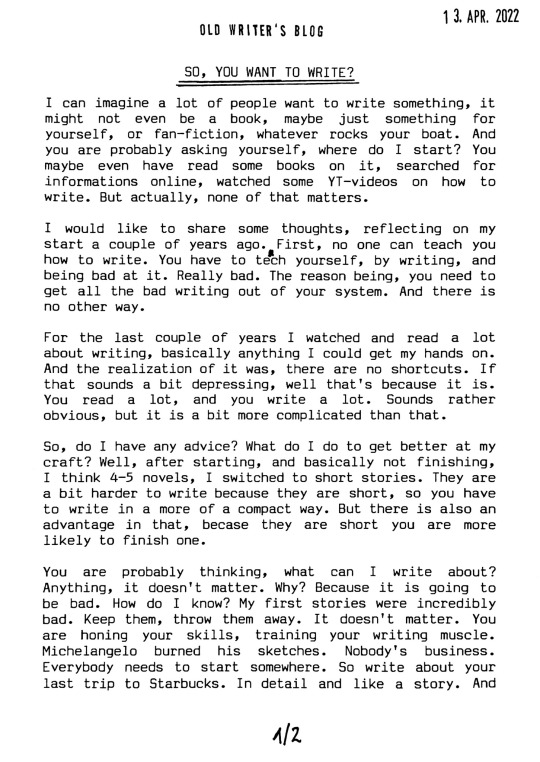

#omg#ohmygoethe#goethe#old#writer#blog#writerslife#oldwritersblog#typewriter#books#writerscommunity#writing#creative writing#writers on tumblr#ask me about paper#fountain pens#fountain pen#practice#your writing#practice your writing
3 notes
·
View notes


